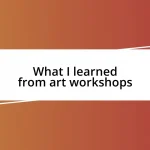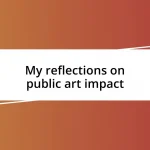Key takeaways:
- Participation in drama allows for emotional expression and self-discovery through various techniques like improvisation and method acting.
- Overcoming performance anxiety involves shifting focus from self-doubt to storytelling, enhancing authenticity through vulnerability.
- Collaboration and sharing experiences with others enrich personal growth and amplify individual voices within the drama community.
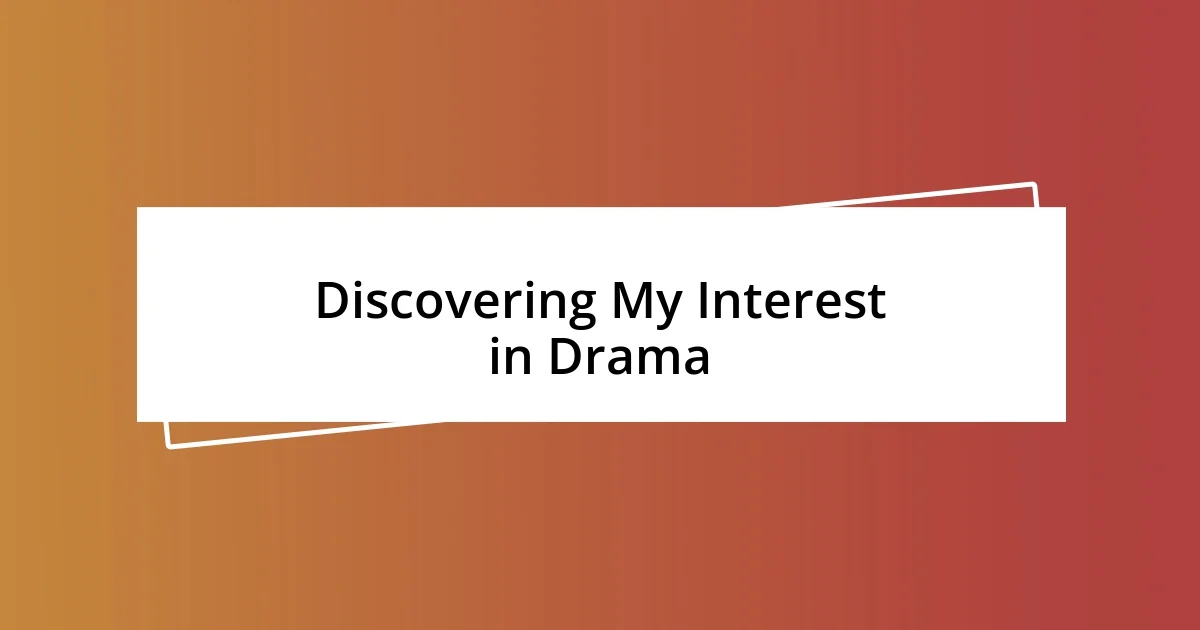
Discovering My Interest in Drama
I still remember the first time I stepped onto a stage for a school play. My heart raced and palms were sweaty, but as I delivered my lines, I felt an exhilarating rush. Was this what it meant to be alive—pouring my emotions into a character and sharing a story with an audience?
In high school, I auditioned for a drama club production on a whim, not entirely sure what to expect. The moment I heard the casting results, I was filled with a mixture of excitement and dread. How could I possibly embody someone else’s life? But that feeling of stepping into another person’s shoes ignited something deep within me, a sense of curiosity like no other.
As I explored various roles, I couldn’t help but notice how they allowed me to express feelings I often kept hidden. Each character taught me something new about myself, from vulnerability to resilience. Isn’t it fascinating how drama gives voice to emotions that words alone sometimes fail to capture?

Exploring Different Drama Techniques
Diving into the realm of drama techniques felt like unlocking a treasure chest filled with tools for expression. I remember experimenting with improvisation during a workshop – the electricity in the room was palpable. As we played off each other’s energy, I learned that spontaneity often reveals the most genuine emotions. This technique swept away the layers of self-consciousness, allowing me to tap into a raw version of myself that I hadn’t encountered before.
Here are a few drama techniques I found particularly enlightening:
- Improvisation: Encourages spontaneity and agility in portraying emotions.
- Method Acting: Involves deeply immersing oneself in the character’s experiences, blurring the lines between reality and performance.
- Tableau: Creating still images with the body to express a scene or concept, which invites reflection on storytelling without words.
- Physical Theatre: Focuses on the body as a primary means of expression, breaking away from traditional dialogue-heavy methods.
Each technique opened new doors for my creativity and self-discovery, and I was continually surprised by the layers of my voice I was uncovering along the way.
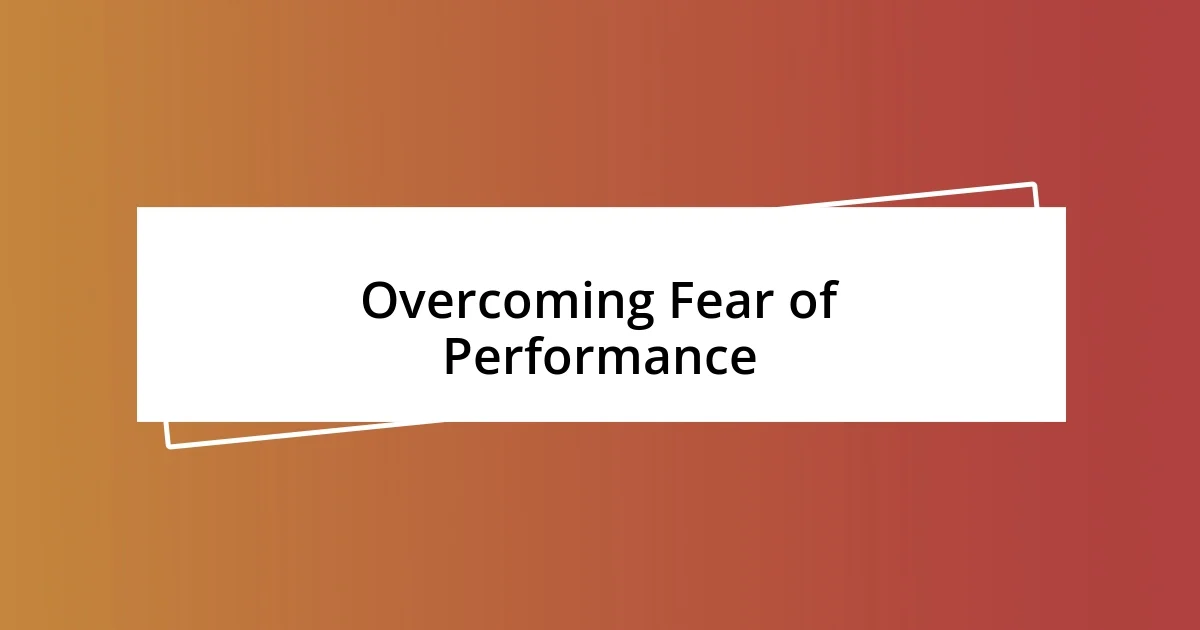
Overcoming Fear of Performance
Stepping into a dramatic role can feel daunting, especially when the spotlight beams down, magnifying fear. I remember my first performance where I could barely catch my breath backstage, envisioning a sea of judging faces. But as I took that initial step, something incredible happened—I discovered that the energy of the audience transformed my nerves into adrenaline, pushing me to channel my fear into passion.
Building confidence takes time and practice. One powerful moment for me was during a dress rehearsal when I completely flubbed a line. Instead of panicking, I chose to laugh it off, and the audience responded with hearty laughter. That experience taught me that it’s okay to be imperfect; embracing vulnerability can actually enhance my authenticity on stage. The more I performed, the more I realized that those moments of fear were stepping stones toward growth.
To confront my performance anxieties, I often visualized success before I stepped on stage. Just picturing myself engaged and connecting with the audience created a reassuring mental picture. I found that when I focused on sharing a story rather than worrying about being perfect, the fear began to fade. Have you tried shifting your perspective like this? It truly transformed my experience.
| Fear Response | Growth Response |
|---|---|
| Overwhelmed by anxiety | Channeling energy into performance |
| Avoiding mistakes | Embracing vulnerability as authenticity |
| Focusing on self | Concentrating on connecting with the audience |

Finding My Unique Style
Finding my unique style in drama was a winding journey filled with moments of discovery. I vividly recall a workshop where we were encouraged to use everyday objects as props. One day, I picked up an old hat to portray a character and found myself slipping into a persona that felt surprisingly authentic. That small prop transformed my performance, teaching me that sometimes it’s the simplest things that help ignite a distinctive character within us. Have you ever found unexpected inspiration in an everyday item?
As I dove deeper into character work, I also experimented with various vocal techniques. During an early rehearsal, I decided to play with my voice, adjusting pitch and tone while embodying different roles. It was liberating! Suddenly, I felt empowered to express emotions in ways that resonated not just with my audience, but with myself. I found freedom in allowing my voice to fluctuate—from a whisper to a powerful shout. This experience made me realize that my unique style was emerging through the combination of my personality, emotions, and vocal expression. How has exploring your voice illuminated aspects of your own style?
Ultimately, I learned that my unique style in drama isn’t about conforming to a mold, but rather embracing who I am. I’d sit in front of the mirror, practicing monologues, and I noticed the little quirks and nuances I naturally brought to the characters. There was one role where I infused my own struggles into the performance, and it resonated deeply with both me and the audience. It struck me that authenticity is key to standing out on stage. Have you tapped into your true self to enhance your performances?
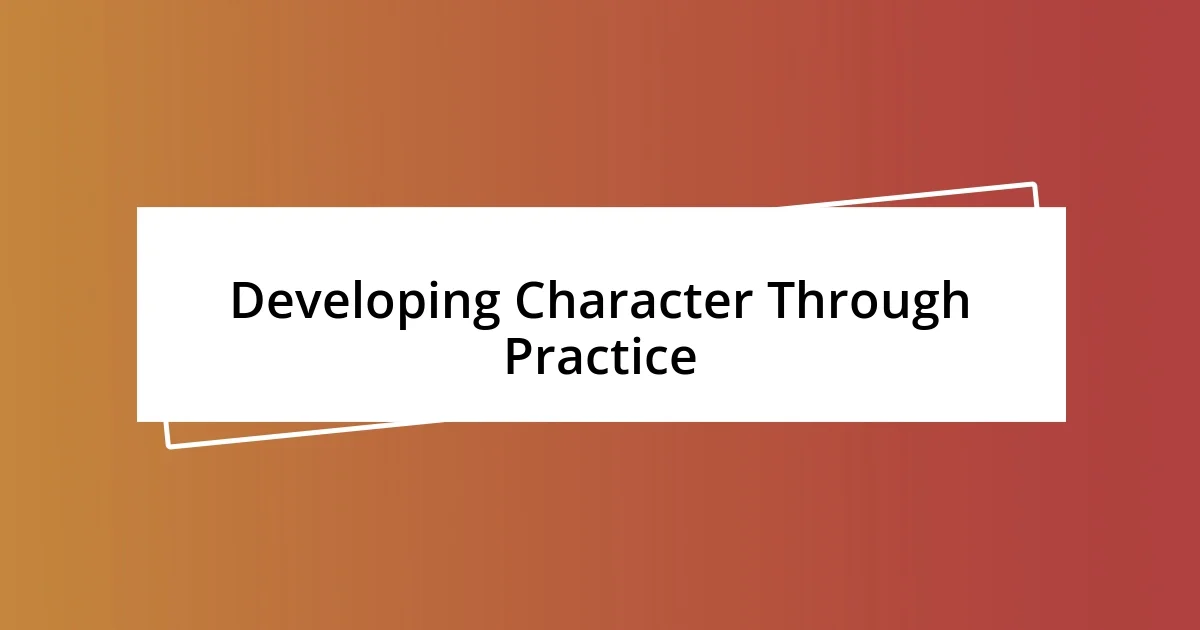
Developing Character Through Practice
Developing character through practice is a journey marked by exploration and reflection. I remember a particularly revealing rehearsal where we focused on physicality. I decided to incorporate a unique gait for my character. As I walked around the stage, each step began to resonate with a different emotional weight, helping me embody the essence of who my character was. Have you ever noticed how the way we move can completely alter our presence on stage?
Voice exercises also played a significant role in my character development. One day, I discovered the power of breath control during a voice workshop. I practiced deep breathing while delivering lines, which transformed my character’s dialogue into an emotionally charged experience. This exercise not only helped me project with clarity but also allowed me to convey deeper emotions. Have you ever tried connecting your breath to your character’s journey?
Through consistent practice, I found that rehearsing with intention allowed me to peel back layers of each character. There was a moment in a scene where I paused before delivering a key line. That brief silence added a whole new depth to the performance, revealing my character’s hesitance and vulnerability. This taught me that sometimes, less is more. How do you find those moments of stillness in your acting?
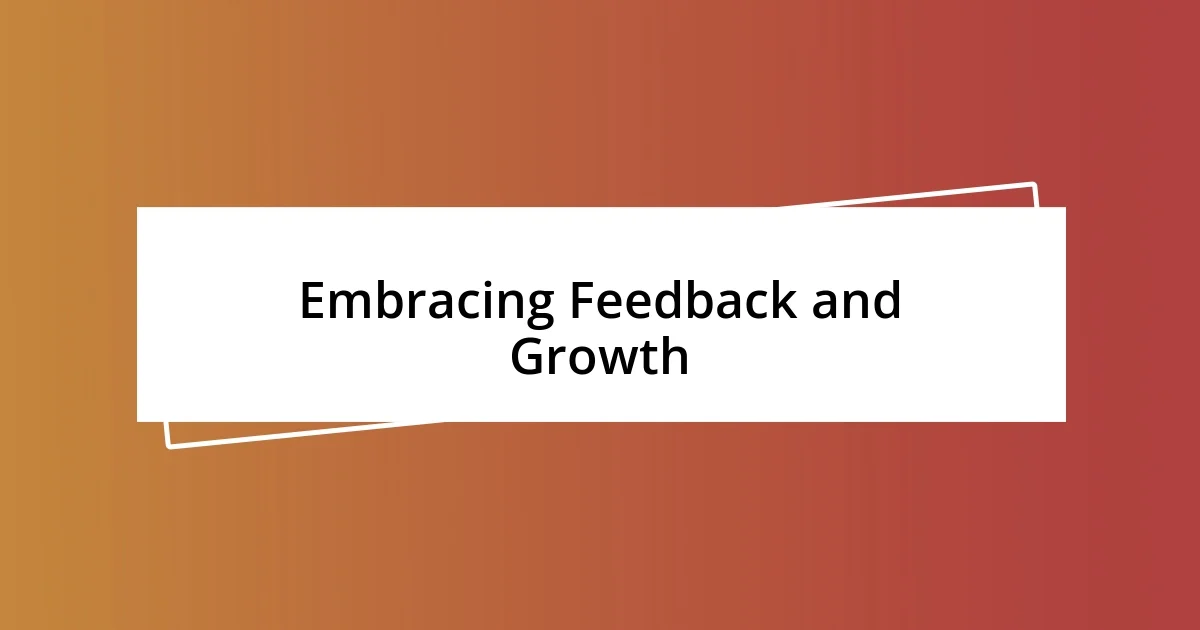
Embracing Feedback and Growth
Feedback can be a double-edged sword in the world of drama, but I learned to embrace it wholeheartedly. After a particularly challenging performance, a trusted mentor sat me down and shared her insights. Initially, I cringed at the thought of hearing what I did wrong, but her constructive criticism opened my eyes to nuances I’d overlooked. Have you ever realized that, without feedback, growth is nearly impossible?
I remember attending a peer review session where we watched each other’s scenes. As I listened to my fellow actors’ perspectives, I was struck by how diverse interpretations could provide fresh angles on my work. One actor pointed out that my emotional expressions were sometimes too subtle, and at first, I felt defensive—who doesn’t want to believe they’re conveying the right emotions? But then I reflected on it and began exploring more pronounced expressions in later scenes. Do you find that sometimes the hardest feedback can lead to the most significant breakthroughs?
Over time, I came to cherish the feedback loop as part of my growth. I established a routine where I’d ask for critiques from trusted friends after rehearsals. One evening after a performance, a friend suggested I incorporate a pause to build tension. I tried it in the very next rehearsal, and the difference was astounding! It felt as though the whole scene transformed, creating an electric moment on stage. How do you incorporate feedback into your own journey, and do you find it helps you discover new layers to your performances?
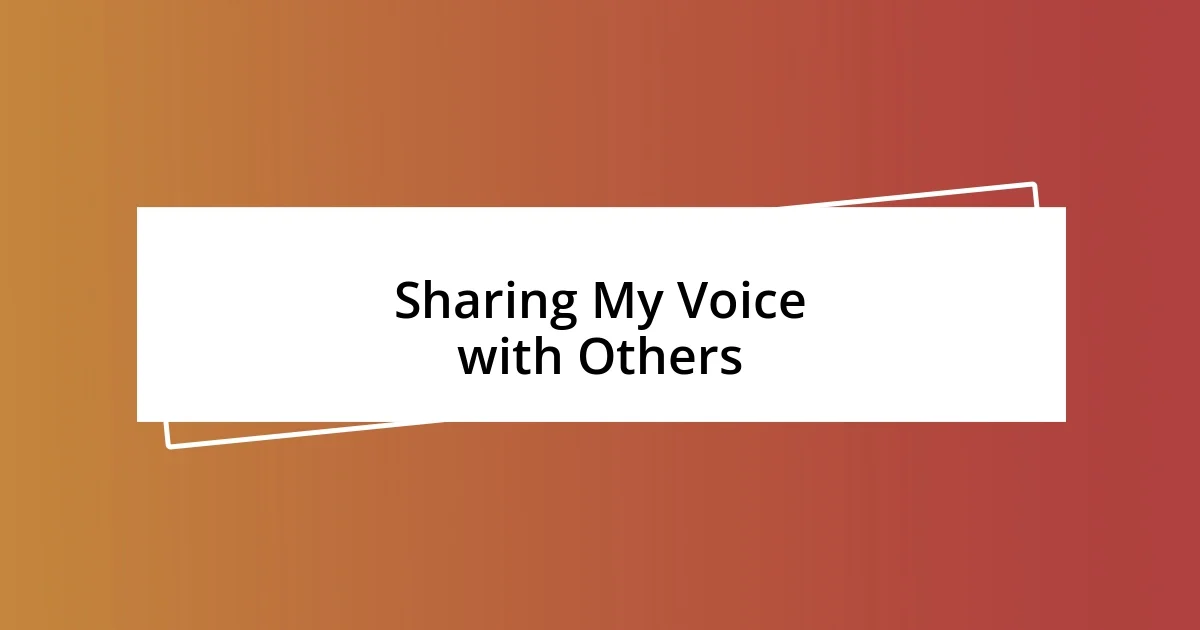
Sharing My Voice with Others
Sharing my voice with others in drama has been one of the most liberating experiences of my artistic journey. During a community theater production, I decided to lead a workshop on character voice and, surprisingly, found myself energized by my peers’ enthusiasm. Their eagerness to explore vocal variety and emotional depth brought a new vibrancy to the practice, reminding me that sharing my insights not only benefited them but also enriched my own understanding of performance. Have you ever noticed how collaboration can ignite creativity?
In another instance, I participated in a storytelling event where sharing my personal experiences became a centerpiece of my performance. As I recounted my struggles in finding my voice, I felt an exhilarating connection with the audience. It was as if our collective stories intertwined, creating a tapestry of shared emotions and experiences. I found that in those moments of vulnerability, my voice resonated most powerfully. Can you recall a time when your story connected with someone in a meaningful way?
Encouraging others to find their voice has become an integral part of my practice. Once, I facilitated a peer feedback group where we discussed techniques for vocal expression. Hearing others share their growth inspired me to revisit my own practices, reinforcing the idea that voice is not just a personal endeavor; it thrives in community. I often ponder, how can we each cultivate an environment that encourages everyone to share their unique voice without fear? Through sharing, we don’t just find our voices—we amplify them together.



